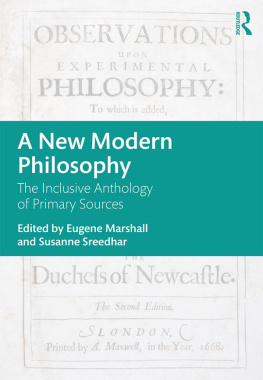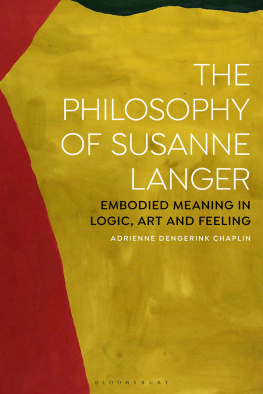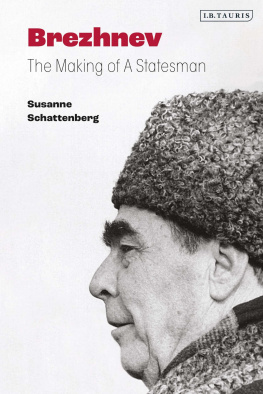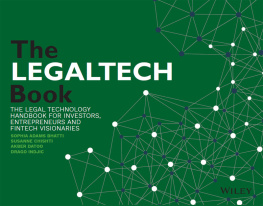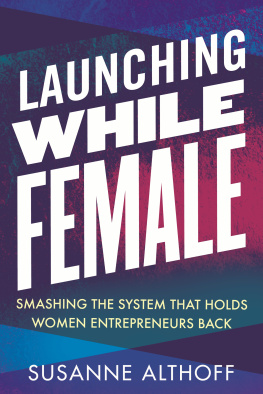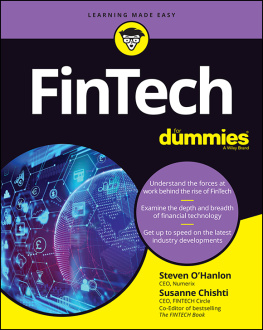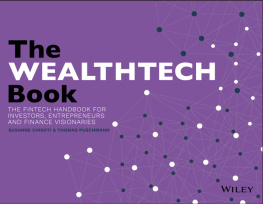Eugene Marshall and Susanne Sreedhar - A New Modern Philosophy
Here you can read online Eugene Marshall and Susanne Sreedhar - A New Modern Philosophy full text of the book (entire story) in english for free. Download pdf and epub, get meaning, cover and reviews about this ebook. year: 2019, publisher: Taylor and Francis, genre: Religion. Description of the work, (preface) as well as reviews are available. Best literature library LitArk.com created for fans of good reading and offers a wide selection of genres:
Romance novel
Science fiction
Adventure
Detective
Science
History
Home and family
Prose
Art
Politics
Computer
Non-fiction
Religion
Business
Children
Humor
Choose a favorite category and find really read worthwhile books. Enjoy immersion in the world of imagination, feel the emotions of the characters or learn something new for yourself, make an fascinating discovery.
- Book:A New Modern Philosophy
- Author:
- Publisher:Taylor and Francis
- Genre:
- Year:2019
- Rating:3 / 5
- Favourites:Add to favourites
- Your mark:
- 60
- 1
- 2
- 3
- 4
- 5
A New Modern Philosophy: summary, description and annotation
We offer to read an annotation, description, summary or preface (depends on what the author of the book "A New Modern Philosophy" wrote himself). If you haven't found the necessary information about the book — write in the comments, we will try to find it.
A New Modern Philosophy — read online for free the complete book (whole text) full work
Below is the text of the book, divided by pages. System saving the place of the last page read, allows you to conveniently read the book "A New Modern Philosophy" online for free, without having to search again every time where you left off. Put a bookmark, and you can go to the page where you finished reading at any time.
Font size:
Interval:
Bookmark:
The seventeenth and eighteenth centuries are arguably the most important period in philosophys history, given that they set a new and broad foundation for subsequent philosophical thought. Over the last decade, however, discontent among instructors has grown with coursebooks unwavering focus on the eras seven most well-known philosophersall of them white and maleand on their exclusively metaphysical and epistemological concerns. While few dispute the centrality of these figures and the questions they raised, the modern era also included essential contributions from womenlike Margaret Cavendish, Elisabeth of Bohemia, Mary Wollstonecraft, and milie du Chteletas well as important non-white thinkers, such as Anton Wilhelm Amo, Julien Raimond, and Ottobah Cugoano. At the same time, there has been increasing recognition that moral and political philosophy, philosophy of the natural world, and philosophy of racealso vibrant areas of the seventeenth and eighteenth centuriesneed to be better integrated with the standard coverage of metaphysics and epistemology.
A New Modern Philosophy: The Inclusive Anthology of Primary Sources addressesin one volumethese valid criticisms. Weaving together multiple voices and all of the eras vibrant areas of debate, this volume sets a new agenda for studying modern philosophy. It includes a wide range of readings from 34 thinkers, integrating essential works from all of the canonical writers along with the previously neglected philosophers. Arranged chronologically, editors Eugene Marshall and Susanne Sreedhar provide an introduction for each author that sets the thinker in his or her time period as well as in the longer debates to which the thinker contributed. Study questions and suggestions for further reading conclude each chapter. At the end of the volume, in addition to a comprehensive subject index, the book includes 13 Syllabus Modules, which will help instructors use the book to easily set up different topically structured courses, such as The Citizen and the State, Mind and Matter, Education, Theories of Perception, or Metaphysics of Causation.
And an eresource offers a wide range of supplemental online resources, including essay assignments, exams, quizzes, student handouts, reading questions, and scholarly articles on teaching the history of philosophy.
Eugene Marshall is Associate Professor of Philosophy at Florida International University. He is the author of The Spiritual Automaton: Spinozas Science of the Mind (2014) and editor of Margaret Cavendishs Observations Upon Experimental Philosophy (2016).
Susanne Sreedhar is Associate Professor of Philosophy and Womens, Gender, and Sexuality Studies at Boston University. She is the author of Hobbes on Resistance: Defying the Leviathan (2010) and a number of articles and book chapters. Her current research is on notions of gender in early modern social contract theory.
The Inclusive Anthology of Primary Sources
Edited by Eugene Marshall and Susanne Sreedhar

First published 2019
by Routledge
52 Vanderbilt Avenue, New York, NY 10017
and by Routledge
2 Park Square, Milton Park, Abingdon, Oxon, OX14 4RN
Routledge is an imprint of the Taylor & Francis Group, an informa business
2019 Taylor & Francis
The right of Eugene Marshall and Susanne Sreedhar to be identified as the authors of the editorial matter, and of the authors for their individual chapters, has been asserted in accordance with sections 77 and 78 of the Copyright, Designs and Patents Act 1988.
All rights reserved. No part of this book may be reprinted or reproduced or utilized in any form or by any electronic, mechanical, or other means, now known or hereafter invented, including photocopying and recording, or in any information storage or retrieval system, without permission in writing from the publishers.
Trademark notice: Product or corporate names may be trademarks or registered trademarks, and are used only for identification and explanation without intent to infringe.
Library of Congress Cataloging-in-Publication Data
Names: Marshall, Eugene, 1974 editor.
Title: The new modern philosophy : the inclusive anthology of primary sources / edited by Eugene Marshall, Susanne Sreedhar.
Description: 1 [edition]. | New York : Routledge, 2019. | Includes bibliographical references.
Identifiers: LCCN 2018046801 (print) | LCCN 2019004609 (ebook) | ISBN 9781351052269 (ebk) | ISBN 9781138484337 (hbk) | ISBN 9781138484344 (pbk)
Subjects: LCSH: Philosophy, ModernHistory. | Philosophers. | Philosophy, ModernHistorySources.
Classification: LCC B790 (ebook) | LCC B790 .N49 2019 (print) | DDC 190dc23
LC record available at https://lccn.loc.gov/2018046801
ISBN: 978-1-138-48433-7 (hbk)
ISBN: 978-1-138-48434-4 (pbk)
ISBN: 978-1-351-05226-9 (ebk)
Typeset in Times New Roman
by Wearset Ltd, Boldon, Tyne and Wear
Visit the eresource: www.routledge.com/9781138484337
In this introduction, we would like to discuss how to teach modern philosophy to undergrads. In order to answer the question of how, though, it might be useful first to ask why.
Why do we teach surveys of modern philosophy to undergrads? Most departments offer such a course and many require it for the major. Why is this course such a staple of departments across the country? Now, we are not simply asking why this course is worthy, full stop; rather, we are interested in why we so often offer or even require this course rather than other courses we could offer or require. Is the hoary History of Modern survey worthy of its central location in undergraduate curricula? If so, why? That is the question we would like to investigate.
Let me begin by stating what should be the obvious, given this volume: we DO think we should teach surveys in modern philosophy to our undergrads! In this section, however, we are going to look more critically at a bunch of reasons that we normally hear in answer to the why question. We will finally settle on a modest answer to the why question and then see how that answer shapes how and what we should teach in modern surveys.
Before we consider a bunch of reasons we often hear, let us make a distinction between the group of reasons one might give for conducting research in the history of modern philosophy (or perhaps teaching grad seminars in it) and requiring it of undergrads. Given that most undergrad majors do not go to grad school to become philosophy professors, these two groups of reasons might be fairly distinct. What we will say concerns only teaching to undergrads. Though some of our observations might apply to the work of graduate students and researchers, we will leave such applications aside today.
So: why teach modern to undergrads? We suppose one reason someone might give is that we ought to do so because we always have (for rather short values of always, given that the tradition of doing so is not more than a century or so old). Call this institutional inertia. We think we can all agree this reason stinks, frankly, and so we wont spend much time on it.
OK, we shall divide the reasons we often encounter into two groups, intrinsic value (A) and instrumental value (B). Most people probably believe the modern survey has both intrinsic and instrumental value for undergrads, and we agree, so we do not take the taxonomy here to be exclusiveor exhaustive, for that matter. First, we will consider some claims about the intrinsic value of the modern survey course for undergrads.
Font size:
Interval:
Bookmark:
Similar books «A New Modern Philosophy»
Look at similar books to A New Modern Philosophy. We have selected literature similar in name and meaning in the hope of providing readers with more options to find new, interesting, not yet read works.
Discussion, reviews of the book A New Modern Philosophy and just readers' own opinions. Leave your comments, write what you think about the work, its meaning or the main characters. Specify what exactly you liked and what you didn't like, and why you think so.

